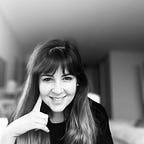Being a woman in 2021
What does that even mean? Being a woman in 2021.
To me, it means having a false sense of safety and knowing how to balance who I am with what society expects of me. As an immigrant, it requires me to know how to balance my identity with what is acceptable. I can be colourful, but not loud, strong but not too assertive, kind, but not a pushover.
In 2021 you can look good but not be smart, or be smart but not too well dressed or good looking. You can be respected or liked, you can be feminine or professional, you can have a diverse background or be intelligent. In today’s world, you cannot be both, and that is ridiculous.
You can only carry one social tag, if you are too diverse, your voice may disappear in the crowds. White feminists will usually not see their own biases and thus, will not fight against the challenges faced by BIPOC. Being a woman in 2021 means navigating intersectionality, fighting the underlying patriarchy of our world while choosing the battles you want to fight, because you can either be BIPOC or be a feminist, the two rarely walk hand in hand.
Being a woman in 2021 means I have more chances of dying in a car accident because tests are made with the measures of a male body. It means having to protect myself at all times, it means having to fight to be believed if I am abused. It means having to fight for justice and equality every single day and if I become a victim of abuse, harassment, or violence, I need to be prepared to prove the incident while also justifying every action, outfit or friendship in my past. It means I’ll probably die before the police take my ex’s threats seriously, and if I am part of a visible minority, it means I face a bigger risk of becoming a victim of sexual violence, human trafficking, and prostitution.
It still means I live day in and day out with societal pressures and expectations that I will be nurturing, I’ll get married, I’ll become a mother, and let’s not forget that I shall also be a “good mother”, a “good wife”. It means that every time I leave my house I am not sure if my physical integrity will be respected, I think of what I am wearing and how am I presenting myself to society. If I wear a hijab, I am Black, indigenous, Arab or Latina, all of those considerations are exacerbated as I also have to fight the biases, stereotypes and prejudices that people have and which put me more at risk.
If I am gay, believe it or not, but in 2021, I still hear sexist jokes, and might be sexually abused because some men think they can “teach me to be different”. In 2021 rejecting a man might be ok in some cultures and countries, but might also mean he will harass me, rape me, throw acid in my face and even kill me because he had to teach me a lesson about rejecting him.
Being a woman in 2021 still means that I might be the 1 in 3 that will be sexually abused in her lifetime, 1 in 3 that will suffer some sort of violence from an intimate partner or not, part of 38% that will be murdered by my partner. We are 51% of all the human trafficking in the world, and more affected by poverty than men. Again, BIPOC are also more affected and when it comes to the pay gap, racialized women make 85cents for every dollar a non-racialized woman makes. This translates itself to 58cents for every dollar a non-racialized man makes.
Yes, we have advanced and a lot of progress has been made, but that does not mean that being a woman in 2021 is easy. Being a BIPOC or part of the LGBTQ+ community is even harder and although we should definitely celebrate the progress, we must also continue to hold conversations and be intentionally more inclusive and intersectional when talking about women’s rights.
So on this women’s history month, don’t just do a campaign or post a photo, don’t just buy flowers for your partner or celebrate our rights. Take this time to elevate and support the women you know, ask them what are the challenges they still face and ask how can you be an ally.
